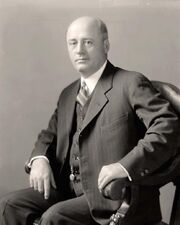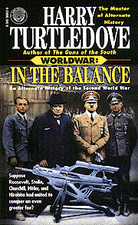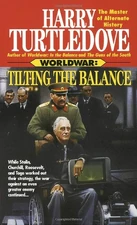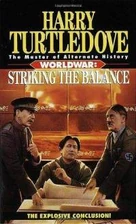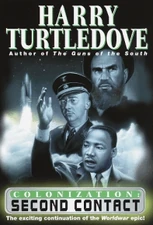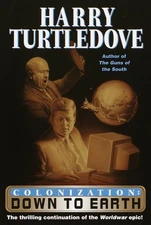| ||||||||||||||||||||||||||||||
Samuel Taliaferro[1] Rayburn (January 6, 1882 - November 16, 1961), widely known as Mr. Sam, was a Democratic politician from Bonham, Texas. He served as leader of the Democratic caucus in the U.S. House of Representatives from 1940 to 1961, being Speaker whenever the Democrats were in the majority, and at the time of his death was the longest-serving Congressman in US House history.
Sam Rayburn in The Man With the Iron Heart[]
Sam Rayburn held the office of Speaker of the House of Representatives in the immediate aftermath of World War II and the rising of the German Freedom Front.[2] A staunch Democrat, he followed the Truman Administration's lead on maintaining an American presence in Germany.[3] This stance brought himself into conflict with Republican Congressman Jerry Duncan throughout 1945 and 1946.[4]
| The Man With the Iron Heart POD: May 29, 1942; Relevant POD: May, 1945 | |
| Type of Appearance: | Direct |
| Political Office(s): | United States Representative from Texas, Speaker of the House |
In the wake of the Republican takeover of Congress in 1946, Rayburn was relegated to House Minority leader in 1947, and he was succeeded by Joseph W. Martin.[5] Rayburn still supported the Truman Administration as loudly as he could on the House floor, and still clashed with Duncan.[6]
Sam Rayburn in Worldwar[]
Literary comment[]
| Worldwar POD: May 30, 1942 | |
| Appearance(s): | Upsetting the Balance |
| Type of Appearance: | Contemporary reference (first edition only) |
On page 435 of the first hardcover edition of Upsetting the Balance, General Leslie Groves reflects that House Speaker Sam Rayburn will succeed the dying Franklin D. Roosevelt to the presidency, now that Vice President Henry Wallace has been killed in a Race bombing raid. Harry Turtledove was informed, before the second edition went to press, that the House Speaker was not in the succession in the early 1940s, so the passage was changed to refer Secretary of State Cordell Hull, eliminating any mention of Rayburn.
Sam Rayburn in "News From the Front"[]
| "News From the Front" POD: December 8, 1941 | |
| Type of Appearance: | Contemporary references |
On June 16, 1942, the Washington Post reported that House Speaker Sam Rayburn had met with House Judiciary Chairman Hatton Sumners to begin impeachment proceedings against President Franklin D. Roosevelt in response to the numerous set-backs that the U.S. had faced immediately after its entry into World War II.[7]
Sam Rayburn in The War That Came Early[]
| The War That Came Early POD: July 20, 1936; Relevant POD: September 29, 1938 | |
| Appearance(s): | The Big Switch |
| Type of Appearance: | Contemporary reference (unnamed) |
House Speaker Sam Rayburn presided over the joint session of the U.S. Congress wherein President Franklin D. Roosevelt issued a formal declaration of war against Japan, on January 12, 1941.[8]
Literary comment[]
Rayburn isn't named, but there is no reason to think someone else was Speaker.
Sam Rayburn in Joe Steele[]
Literary comment[]
| Joe Steele POD: 1878; Relevant POD: July, 1932 | |
| Novel or Story?: | Story only |
| Type of Appearance: | Direct |
| Date of Death: | 1937 |
| Cause of Death: | Engineered automobile accident |
In the short story, Representative Sam Rayburn (1882-1937) takes the Capitol floor to denounce President Joe Steele's draconian purge of the U.S. Army in 1937. Two days later, he is injured in a "big old goddamn traffic smashup" and dies on the way to the hospital. The clear implication is that this traffic "accident" was arranged by Steele.
Rayburn is not referenced in the novel at all.
See also[]
- Joseph Guffey, the Speaker of the House in the early 1940s in Southern Victory.
References[]
- ↑ Taliaferro is pronounced "Tolliver."
- ↑ The Man With the Iron Heart, pg. 100.
- ↑ Ibid.
- ↑ See, e.g., Ibid, pgs. 100-103, 256-259.
- ↑ Ibid. pg. 342.
- ↑ Ibid., pgs. 342-345.
- ↑ See, e.g., Atlantis and Other Places, pg. 120.
- ↑ The Big Switch, pg. 402.
| Titles and Succession | ||||||||||||||||||||||
|---|---|---|---|---|---|---|---|---|---|---|---|---|---|---|---|---|---|---|---|---|---|---|
| ||||||||||||||||||||||
| ||||||||||||||||||||||||||||||||||||||||||||||||||||||||||||||||||||||||||||||||||||||||||||||||||||||||
